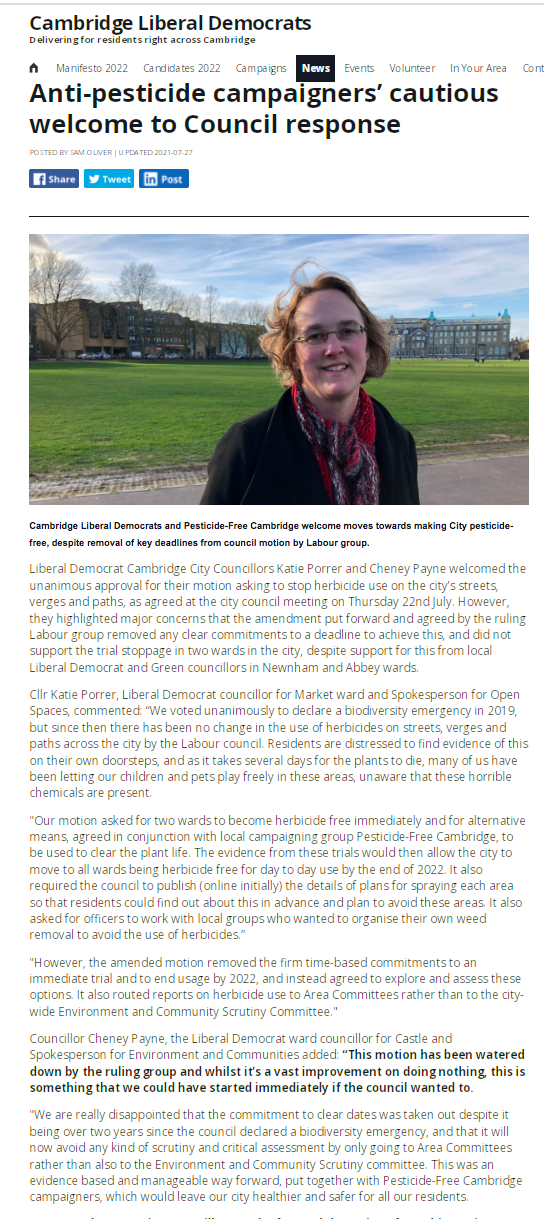Cambridge Lib Dem/PFC Press Release, 27 July 2021: Herbicide-Free Motion
- Pesticide-Free Cambridge
- Jul 26, 2021
- 3 min read
Updated: Nov 4, 2022
Anti-pesticide campaigners’ cautious welcome to Council response". Cambridge Lib Dem/ PFC Press Release.
Includes PFC statement as follows:
We are delighted that the motion has been passed, although Labour’s amendments have removed much of the clarity and force of the original motion which is disappointing. For example, with regards the timeline for trialling alternatives and phasing out herbicides across the city, original references to ‘commitment’ have been replaced by more vague terms such as ‘explore’ and ‘assess’ which raises the risk of further causes of delay, something that we have been highlighting over the last 14 months as a major contradiction to the Council’s 2019 declaration of a Biodiversity Emergency. Further, in the amended motion, the original proposal 'to commit to publishing the planned dates of herbicide treatments by road/ward for the remainder of 2021 and thereafter on the council’s website', is now preceded by the following qualification, 'to explore the most effective methods of communicating with residents (and any additional resource implications) about any necessary herbicide applications, which may include the following commitments’.
However, even with these amendments, we are happy that in the passing of this motion we now have, in principal, a statement of intent from the Council to explore herbicide-free alternatives for weed control in two wards before the next spraying season of this year (Sept 2021), with the view to stopping all herbicide-use across the city by the end of 2022. This is the first time we've seen any date at all for the end of council herbicide-spraying despite numerous statements of intent over the last year, and so this in itself is a major step forward and improvement on the previous stalemate. We will continue therefore to work with all concerned to try to hold the Council to this position, and to ensure it implements its intention to prewarn residents about spraying schedules, and to put up appropriate signage. This is something we’ve been suggesting for years as a minimum step towards reducing residents’ direct exposure to toxic glyphosate during the 5-10 days that it takes for plant die-off to occur. Further, we hope that by raising public concern amongst residents who may have been previously unaware this was even going on, such measures may also help to bring forward the end-of-2022 target for ending herbicide-use across the city.
We are hugely thankful to Councillors Katie Porrer and Cheney Payne for having worked with us to propose the motion, and we look forward to exploring herbicide-free alternatives with the Council to see what works best for the two as-yet-to-be-selected trial wards, in advance of the next spraying season in autumn of this year. As shown by case-studies from other towns that have successfully gone herbicide-free,(1) it is unlikely that a single method will fit the needs of every ward. We agree, therefore, that trialling different alternatives is a sensible approach especially as we have been unable as yet to persuade the Council to effect an immediate ban. This would have been the ideal route, as followed recently for example, by Bath Council who have switched to an immediate use of mechanical weeding until such time as alternative measures can be trialled.(2) However, we hope that two-ward trial this year will allow for a rapid rollout of the most appropriate herbicide-free approaches over the whole city as early as possible next year.
Even with its removal of crucial terms such as ‘commitment’ from the original motion, the Council’s declared intention to end its use of herbicides by the end of 2022 is a hugely important step towards achieving our end goal which is to make the city completely pesticide free, including the use of herbicides and insecticides by other stakeholders such as the universities, businesses, schools and residents. As shown by the nearly-550-signatures on our petition,(3) that also calls for the council to run public awareness building campaigns about the biodiversity and health dangers of pesticides, there is widespread support for removing these toxic substances not only from council-owned streets, pavements and open spaces, but from our homes and gardens too.
References:






Comments